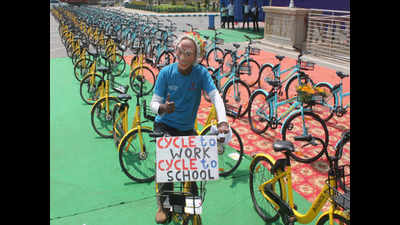- News
- City News
- bengaluru News
- Hit the pedal with Trin Trin in Bengaluru for last-mile green ride
Trending
This story is from March 5, 2019
Hit the pedal with Trin Trin in Bengaluru for last-mile green ride
Chief minister HD Kumaraswamy on Monday launched Bengaluru’s full-fledged Public Bicycle Sharing (PBS) system with 3,000 bicycles. But the big question is: Where are the cycle tracks?

Currently, about 3,000 cycles are available across parking hubs, which will be expanded to 6,000 in a phased manner
BENGALURU: Chief minister HD Kumaraswamy on Monday launched Bengaluru’s full-fledged Public Bicycle Sharing (PBS) system with 3,000 bicycles. But the big question is: Where are the cycle tracks?
The dock-less bicyclesharing system, Trin Trin, comprises app-based multiple private bicycle sharing operators who rent out biycles for public use at nominal prices. “This is an environment-friendly mode for citizens for first- and lastmile connectivity to and from Metro stations and bus terminals.People can shift to public transport to reduce pollution, Kumaraswamy said,while pointing to its success in Mysuru.
The directorate of urban land transport (DULT), the agency overseeing the bicyclesharing project, has identified 400 parking hubs in areas like HSR Layout, Banaswadi, HRBR Layout, Koramangala, Indiranagar, Vidhana Soudha, MG Road and at all Metro stations. Currently, about 3,000 cycles are available in these parking hubs, which will be expanded to 6,000 cycles in a phased manner.
“PBS is a flexible form of personal public transport, where a user can check out a cycle from a parking hub, use it for a short ride and return it to any other designated place. These locations are identified in a closely spaced network to facilitate easy pick-up and return of cycles,” said DULT commissioner V Ponnuraj. Globally, around 600 cities, including Shanghai, Washington, Paris and London, have bicycle-sharing system. Vivekananda HR, co-founder, Bounce, said, “I strongly feel this will be a tipping point in shared mobility and public transport system.”
While the much-delayed PBS system has brought cheer among cyclists, in the absence of dedicated lanes, most of them say it is difficult to pedal through congested roads. “It’s not easy to cycle in the city as motorists often honk and twowheelers ride on pavements. Bengaluru has an ideal climate for cycling, but authorities should also provide sufficient infrastructure,” said Rajesh S, a cycling enthusiast. At present, there are about 20km of dedicated lanes, including 16km on TenderSure roads in CBD areas, 2km on Cubbon Road and another 2km around Madiwala Lake.
The dock-less bicyclesharing system, Trin Trin, comprises app-based multiple private bicycle sharing operators who rent out biycles for public use at nominal prices. “This is an environment-friendly mode for citizens for first- and lastmile connectivity to and from Metro stations and bus terminals.People can shift to public transport to reduce pollution, Kumaraswamy said,while pointing to its success in Mysuru.
TimesView
At a time when the government has shown sudden urgency in fast-tracking the elevated corridor project and drawn the ire of civic activists, the launch of the Public Bicycle Sharing system Trin Trin in Bengaluru offers some hope. Tapped to its full potential, the initiative could bridge a big gap in last-mile connectivity that has been a bane for the city for long. What’s even better is that this mode of commuting is both eco-friendly and healthy. But for the tech-driven project to succeed, the government must put in place adequate cycle tracks, for without them, the initiative could remain a non-starter.
The directorate of urban land transport (DULT), the agency overseeing the bicyclesharing project, has identified 400 parking hubs in areas like HSR Layout, Banaswadi, HRBR Layout, Koramangala, Indiranagar, Vidhana Soudha, MG Road and at all Metro stations. Currently, about 3,000 cycles are available in these parking hubs, which will be expanded to 6,000 cycles in a phased manner.
So far, DULT has issued permits to four bicycle-sharing operators, including Yulu, Bounce, Lejonet and Zoomcar PEDL. While Zoomcar PEDL suspended operations, Lejonet is yet to deploy cycles in the city.
“PBS is a flexible form of personal public transport, where a user can check out a cycle from a parking hub, use it for a short ride and return it to any other designated place. These locations are identified in a closely spaced network to facilitate easy pick-up and return of cycles,” said DULT commissioner V Ponnuraj. Globally, around 600 cities, including Shanghai, Washington, Paris and London, have bicycle-sharing system. Vivekananda HR, co-founder, Bounce, said, “I strongly feel this will be a tipping point in shared mobility and public transport system.”
While the much-delayed PBS system has brought cheer among cyclists, in the absence of dedicated lanes, most of them say it is difficult to pedal through congested roads. “It’s not easy to cycle in the city as motorists often honk and twowheelers ride on pavements. Bengaluru has an ideal climate for cycling, but authorities should also provide sufficient infrastructure,” said Rajesh S, a cycling enthusiast. At present, there are about 20km of dedicated lanes, including 16km on TenderSure roads in CBD areas, 2km on Cubbon Road and another 2km around Madiwala Lake.
End of Article
FOLLOW US ON SOCIAL MEDIA










